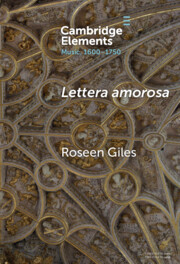About this Cambridge Elements series
Elements in Music, 1600–1750 offers new perspectives on music as it was created, performed, heard and understood within the rich and vibrant cultures of the seventeenth and early eighteenth centuries.
Reflecting the broad approaches of today’s early modern musicologists, the series focuses on musical repertories viewed from multiple angles, incorporating both professional and recreational musical activities; music-making in both urban and rural locations and in a range of institutional and domestic environments; music’s embodiment in listening and performing practices alongside creative practices; music’s interactions with other media, especially in the theatre and in visual culture; the commercialization of musical activities and the role of publishers and purchasers in the life of a musical work; and the formation and transformation of musical identities in an era of international exploration and increasing intercultural exchange.
Cutting across the national boundaries, genre distinctions and European composer-centric focus conventional within traditional ‘Baroque-music’ studies, the series will provide new approaches to understanding the way people from all levels of society across a broad geographical reach experienced music in the period from ca. 1600 to ca. 1750. It is designed to appeal to a wide readership of scholars, students, practitioners and informed musical public.
Key Features:
• Offers new perspectives on sixteenth- and seventeenth-century musical repertories
• Places music of the sixteenth and early seventeenth centuries in a wide range of contexts and locations, addressing conventionally overlooked perspectives
• Considers the musical experiences of diverse groups, including performers, listeners, consumers and publishers as well as composers
• Explores musical repertories in relation to other disciplines
• Investigates music-making from a broad international perspective reflecting the intercultural exchange that flourished in the early modern period
Series Editors:
Rebecca Herissone is Professor of Musicology at the University of Manchester and a Fellow of the British Academy. She is also a Vice-President of the Royal Musical Association, Chair of the Musica Britannica Editorial Committee and a member of several Editorial Boards. Her research focuses on the music of early modern England, particularly issues of creativity, material culture and reception. She has published three monographs, most recently the award-winning Musical Creativity in Restoration England, and articles in a wide range of international journals. She is currently working towards an interdisciplinary study of the material traces of Purcell’s reception.
Daniel R. Melamed is professor at the Indiana University Jacobs School of Music, and has taught at Yale University, the University of North Carolina at Chapel Hill, and Columbia University. He holds a Ph.D. in musicology from Harvard University and an M.A. in choral music and early music performance from Stanford University. He has published books and articles on J. S. Bach, the Bach family, and Mozart opera. He served as editor of the Journal of Musicology and is currently president of the American Bach Society and director of the Bloomington Bach Cantata Project.
Elements in this series
-

- Element
Lettera amorosa
